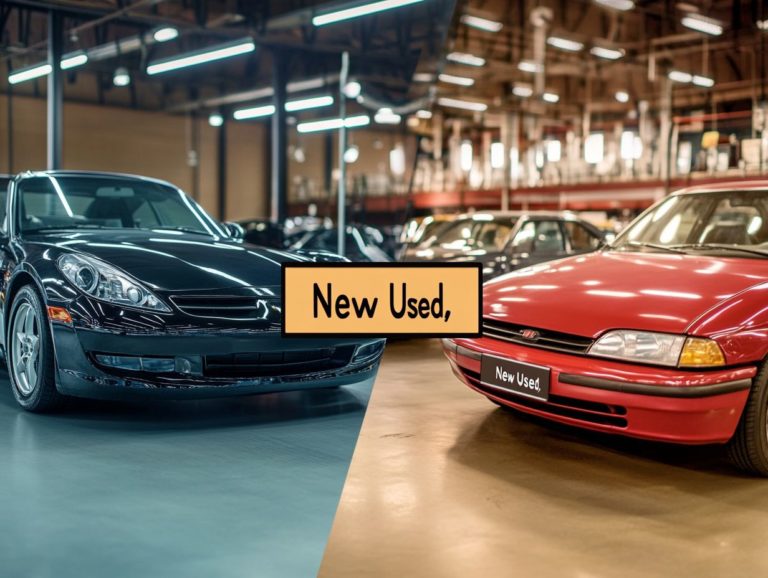5 Questions to Ask Your Dealer Before Buying
Investing in a vehicle is no small matter, and asking the right questions can truly elevate your experience.
Before finalizing your decision, it s crucial to gather information that empowers you to feel confident in your choice. This involves delving into the vehicle’s history and maintenance records, exploring financing options, and warranties.
Arm yourself with the knowledge necessary to navigate the car-buying process effortlessly and with complete assurance.
Contents
- Key Takeaways:
- 1. What Is the Vehicle’s History?
- 2. Can I See the Vehicle’s Maintenance Records?
- 3. What Is the Reason for Selling the Vehicle?
- 4. Can I Take the Vehicle for a Test Drive?
- 5. Is There Any Warranty or Guarantee Included?
- What Is the Dealer’s Reputation and Customer Satisfaction Rate?
- What Are the Financing Options Available?
- What Are the Additional Fees or Charges?
- Is the Vehicle Certified or Inspected?
- What Are the Safety Features of the Vehicle?
- What Are the Available Service Plans?
- What Is the Return Policy?
- Are There Any Special Offers or Discounts?
- What Is the Dealership’s Return Policy?
- What Are the Available Payment Options?
- Is There a Trade-In Option for My Current Vehicle?
- Frequently Asked Questions
- What are the benefits of asking my dealer these 5 questions before making a purchase?
- What is the return policy for the product I am interested in buying?
- Can you provide me with a warranty for the product I am considering?
- Are there any additional fees or charges that I should be aware of?
- Can you provide me with references or reviews from previous customers?
- Is there any flexibility on the price of the product?
Key Takeaways:

Ask about the vehicle’s history to ensure it meets your needs and has no hidden issues or damages.
Request to see maintenance records to understand the vehicle’s upkeep and potential future maintenance costs.
Inquire about the reason for selling the vehicle to gain insight into its condition and potential negotiation points.
1. What Is the Vehicle’s History?
Understanding a vehicle’s history is essential when you re in the market for a car. This includes important factors like ownership history, accident records, and the clear title.
To get a comprehensive vehicle history report, you can turn to services like Carfax or AutoCheck. These platforms offer in-depth insights into the car s past, including its accident history, previous ownership, and whether that title is squeaky clean.
A clear title is particularly vital, as it often leads to lower financing and insurance costs, making your overall ownership experience more budget-friendly.
Knowing the accident history helps you avoid vehicles that might end up costing you a fortune in repairs down the line. Pulling your vehicle history report is a smart move that could save you from costly repairs later on!
2. Can I See the Vehicle’s Maintenance Records?
Requesting the vehicle’s maintenance records is essential for assessing its upkeep and reliability. These records provide valuable insights into the service history, detailing repairs and inspections conducted by trusted mechanics.
As you review these documents, pay particular attention to specifics such as oil changes, brake services, and any significant repairs that may have been necessary over the years. These records not only reflect the consistency and quality of the maintenance but also reveal any recurring issues that could hint at future complications.
Knowing about previous brake replacements or engine repairs can be especially beneficial, as it offers a glimpse into potential costs that may arise down the line. Checking the vehicle’s history helps you make an informed decision regarding its long-term reliability and how to budget for any forthcoming maintenance needs.
3. What Is the Reason for Selling the Vehicle?
Understanding the seller’s motivation for parting with their vehicle can offer you invaluable context, equipping you to make informed decisions by shedding light on the car’s condition and any hidden issues.
Common reasons for selling might include:
- The desire to upgrade to a newer model that boasts improved features and reliability.
- Facing financial challenges that necessitate downsizing.
- Dealing with ongoing maintenance concerns that have become overwhelming.
Grasping this context not only enhances your negotiating power but also enables you to assess how much work the vehicle may require down the line. Inquiring about these motivations during negotiations can significantly impact the final price, as it opens the door for discussions around necessary repairs or pricing adjustments based on the seller’s urgency.
4. Can I Take the Vehicle for a Test Drive?
A test drive is your chance to truly feel the car. It offers you the opportunity to evaluate the engine performance, handling, and overall comfort of the vehicle you re considering.
During this pivotal phase, pay close attention to how the vehicle responds to your commands. You want to ensure it accelerates smoothly and exhibits stability at various speeds. Don t overlook the brakes they’re crucial for your safety!
As you settle into the driver s seat, assess your comfort level by examining the seating position, control layout, and visibility from behind the wheel. Consider the ergonomics of the dashboard and how easily you can access controls. These observations will be invaluable in determining whether the car aligns with your preferences and daily needs.
5. Is There Any Warranty or Guarantee Included?
Inquiring about any warranty or guarantee that comes with your vehicle is essential. It provides peace of mind regarding repairs and maintenance.
Understanding the differences between a manufacturer warranty and an extended warranty can influence your choices. A manufacturer warranty is a promise from the car maker to fix certain problems that happen during the first few years, while an extended warranty can be purchased to cover additional time or mileage.
Extended warranties often come with specific limitations and exclusions. Understanding these terms is vital to avoid surprises later.
This knowledge can lead to significant long-term savings on repairs. Don’t miss out on potential savings!
What Is the Dealer’s Reputation and Customer Satisfaction Rate?

Assessing a dealer’s reputation is crucial for a positive car-buying experience. It reflects their reliability and service quality.
Explore online platforms for customer reviews. These insights can guide your decision-making process and reveal the experiences of others.
Websites dedicated to automotive feedback often provide testimonials that highlight both strengths and weaknesses of a specific dealer. Engaging with forums or social media groups adds a personal touch, as you ll hear real customers share their stories.
Choosing a reputable dealer can significantly influence your financing options and lead to a smoother purchasing journey.
What Are the Financing Options Available?
Exploring financing options is key to securing your purchase. It affects monthly payments and the overall cost of ownership.
From traditional loans to leasing, each option has unique advantages tailored to your financial situation. Leasing often offers lower monthly payments and the flexibility of driving a new vehicle every few years.
When comparing these options, evaluate interest rates, loan durations, and any hidden fees that may lurk in the fine print.
Utilizing a budget calculator can help you gauge potential monthly payments and ensure your financing aligns with your budget.
What Are the Additional Fees or Charges?
Being aware of additional fees when purchasing a vehicle is crucial, as they can impact your overall budget.
Many buyers overlook common fees like dealer fees, documentation fees, and taxes, which can add hundreds, if not thousands, to the purchase price.
Ask about each fee upfront and request a detailed breakdown during the purchasing process. You can also negotiate these fees by comparing offers from different dealerships.
Including these expenses in your total cost of ownership calculations will give you a clearer picture of what the vehicle truly costs over time.
Is the Vehicle Certified or Inspected?
Determining whether the vehicle is certified or has undergone a thorough inspection is crucial for ensuring its quality and safety. This offers you peace of mind about its condition.
A certified vehicle generally means it has passed a more rigorous evaluation than a standard inspection. It typically meets specific criteria established by manufacturers or third-party organizations. This comprehensive process often involves checks on key components, a detailed history report, and sometimes even a warranty. This provides significant assurance for potential owners.
As you consider a purchase, it’s imperative to carefully check the vehicle inspection report. This document can reveal potential issues, such as prior accidents or mechanical problems that could lead to costly repairs down the line.
By identifying these red flags early, you can spare yourself future headaches and financial strain. This ensures you make a well-informed decision.
What Are the Safety Features of the Vehicle?
Evaluating the safety features of a vehicle is absolutely essential when you re considering a purchase. These elements not only enhance the protection of passengers but also contribute to the vehicle s longevity.
Check these features carefully:
- Airbags, which offer crucial cushioning during collisions;
- Anti-lock brakes, which prevent wheel lock-up for improved control;
- Electronic stability control, which helps prevent skidding in challenging driving conditions.
Understanding safety ratings is very important. Vehicles boasting higher safety ratings often come with lower insurance premiums, ultimately reducing your long-term costs.
When it s time to sell, those same ratings can elevate resale value, making it a savvy investment for buyers who prioritize safety.
What Are the Available Service Plans?
Inquiring about available service plans is essential for understanding ongoing maintenance costs. This ensures your vehicle remains in optimal condition through regular check-ups and repairs.
Both dealerships and independent mechanics typically have a range of service plans on offer. These range from basic maintenance packages covering oil changes and tire rotations to more comprehensive options that include extensive inspections, bodywork, and critical component replacements.
Service history is a significant factor when evaluating these plans. A well-documented record can reflect the reliability of the services provided and help you anticipate future costs.
By analyzing this history, you can make informed decisions that ensure smoother operation and potentially reduce the risk of unexpected expenses down the line.
What Is the Return Policy?

Understanding the dealership’s return policy is vital for protecting your investment. It clearly outlines the conditions under which you can return the vehicle if it fails to meet your expectations. As a potential buyer, take the time to carefully examine this policy.
Focus on specific terms, such as time limits, which inform you how long you have to initiate a return, and any conditions that might influence your ability to do so. Delve into aspects like mileage restrictions, wear and tear clauses, and whether a restocking fee applies.
These details play a crucial role in simplifying the return process. They also significantly impact your financing situation. By grasping these guidelines, you can enhance your overall satisfaction and minimize potential financial losses or unexpected setbacks from an unsatisfactory purchase.
Are There Any Special Offers or Discounts?
Exploring special offers or discounts can lead to big savings now when you’re purchasing a vehicle. This makes it a crucial part of the car-buying journey.
By keeping an eye out for manufacturer rebates, seasonal discounts, and various dealership promotional events, you can significantly enhance your negotiating position. These incentives often fluctuate throughout the year, with certain periods like holidays or end-of-year sales showcasing some of the most attractive deals.
Did you know these offers can give you more negotiating power? For example, mentioning an existing manufacturer rebate during discussions could encourage the dealer to make further concessions, ultimately amplifying your savings.
What Is the Dealership’s Return Policy?
The dealership’s return policy is a critical aspect to consider. It plays a significant role in your overall satisfaction and your ability to make adjustments after your purchase.
It s essential to understand the specific timeframes for initiating returns. Make sure to inquire about how many days you have to return a vehicle and any conditions that may apply, such as mileage limits or the vehicle’s condition.
Knowing whether refunds or exchanges are available will empower your decision-making process. A transparent and fair return policy can significantly enhance your trust in the dealership, allowing you to feel more secure in your choices.
When you are aware that options exist if something doesn t meet your expectations, it transforms your buying experience into a more positive one. This ultimately benefits both you and the dealership.
What Are the Available Payment Options?
Understanding the available payment options is essential for aligning your car purchase with your financial situation. This knowledge helps you determine feasible monthly payments and craft an overall budget that works for you.
Whether you opt for traditional cash payments that grant immediate ownership or choose financing options that allow for more manageable monthly installments, each method brings its own set of advantages.
If you’re considering leasing, you might appreciate the lower upfront costs and favorable terms. This makes leasing an attractive option for many buyers.
Using a budget calculator greatly simplifies the process of assessing how monthly payments shift under various financing scenarios, empowering you to make a more informed decision.
By inputting key variables like down payment, interest rates, and loan terms, you can easily gauge what fits best within your financial scope. This ensures a sensible approach to owning your vehicle.
Is There a Trade-In Option for My Current Vehicle?
Exploring the trade-in option for your current vehicle offers a convenient way to offset the purchase price of a new or used car. This enhances your overall car-buying experience.
To consider this option, it s vital to evaluate several factors that influence your trade-in value. These include your vehicle’s condition, mileage, market demand, and any recent repairs or upgrades.
Well-maintained vehicles with a complete service history typically command a better price. When it s time to negotiate, coming prepared can be your secret weapon.
Do your research in advance. Gather quotes from multiple dealerships and utilize online valuation tools to establish a solid baseline figure. Presenting this information with confidence will create leverage, setting the stage for discussions that can lead to a more favorable offer.
Frequently Asked Questions
What are the benefits of asking my dealer these 5 questions before making a purchase?

By asking these questions to ask a used car dealer, you can gather important information about the product and the dealer’s policies. This helps you make a more informed decision while avoiding potential issues or misunderstandings in the future.
What is the return policy for the product I am interested in buying?
It is important to know the return policy in case the product does not meet your expectations or has any defects. Make sure to clarify the process, timeframe, and any associated fees for returns.
Can you provide me with a warranty for the product I am considering?
A warranty is a promise from the dealer to fix or replace a product if it has problems within a specified period. A warranty can provide peace of mind and protection for your purchase. Ask about the length of the warranty, what it covers, and any conditions that may void it.
Are there any additional fees or charges that I should be aware of?
Some dealers may have additional charges such as delivery fees, installation fees, or disposal fees. Make sure to ask about these to avoid any surprises when making your purchase.
Can you provide me with references or reviews from previous customers?
Reading reviews or talking to previous customers can give you insight into the dealer’s reputation and the quality of their products and services. Additionally, knowing 5 things every new car buyer should know is always a good idea to do some research before making a significant purchase.
Don t miss out on the chance to enhance your buying experience! If you have further questions, feel free to reach out or visit our dealership.
Is there any flexibility on the price of the product?
You can always ask if the price can be lowered. Many dealers offer discounts, especially for repeat customers or when buying multiple items.
Don’t miss out on the chance to save money by inquiring about price flexibility!






